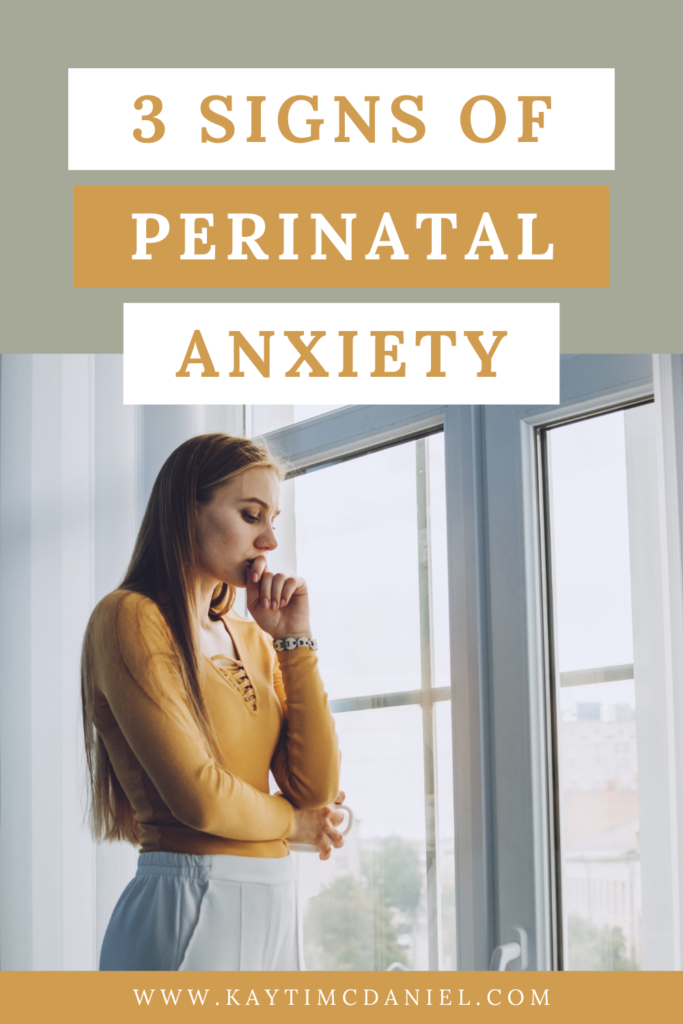
What is perinatal anxiety?
Perinatal anxiety is one of several perinatal mood and anxiety disorders (PMADs)* that can show up during pregnancy and/or the postpartum year. Perinatal anxiety includes prenatal anxiety (aka antepartum anxiety) during pregnancy and postpartum anxiety after birth.
*Perinatal anxiety often refers to generalized anxiety (anxiety about a range of events or activities), which will be the focus of this post. However, you should know that perinatal anxiety can ALSO be used as an umbrella term for a subset of PMADs that include perinatal panic disorder, perinatal OCD (obsessive compulsive disorder), and perinatal PTSD (posttraumatic stress disorder).
Below are 3 common signs of perinatal anxiety. If you’re noticing any one of these signs of perinatal anxiety, consider reaching out to a therapist trained in perinatal mental health. Therapy can help you to better understand your anxiety and learn strategies to manage it well.
Here are 3 signs of perinatal anxiety:
1. Your anxiety feels overwhelming.
We all experience anxiety. It’s a normal, human emotion that cares deeply for your safety and your baby’s safety. As a new parent, it makes SO MUCH SENSE if you’re experiencing more anxiety than usual. You have a quite a few more things to worry about.
Sometimes anxiety looks like:
- having worries or scary thoughts that span a range of life domains (such as parenting, work, physical health, etc.).
- having racing thoughts or feeling as though you can’t calm your mind.
- feeling constant dread or a sense that something bad is going to happen.
If your anxiety feels especially intense, doesn’t seem to go away, and is hard to manage, it may be a sign that you are experiencing perinatal anxiety.
2. Your anxiety is causing physical symptoms.
Like with perinatal depression, anxiety can cause physical symptoms. Some of the more common anxiety-induced physical symptoms are:
- restlessness.
- exhaustion.
- headaches.
- stomach aches.
- muscle tension.
- difficulty sleeping (inc. falling OR staying asleep, even when your baby is sleeping).
When anxiety is most intense, you may even experience panic attacks (as in perinatal panic disorder).
If you are experiencing physical symptoms that you believe may be associated with anxiety, it is important to speak with your medical professional to rule out any medical causes. If you’re medically cleared, these symptoms may be a sign of perinatal anxiety.
3. Your anxiety is getting in the way of your life.
To some extent, worry and concern help to keep you and your new baby safe. For example, if you’re worried about what might happen to you or your baby if your car crashed, you might be especially careful to wear your seatbelt, strap your baby into their carseat securely, and follow traffic laws. These are good things that DO support your safety. This is an example of how some anxiety can be helpful.
BUT, sometimes anxiety is so strong that it starts to take over decisions in day-to-day life. In this example, your concern about a car crash might lead you to make the decision to never get in a car. Your anxiety, which can be persuasive, might convince you to stay “safe and sound” at home — even if that means you are unable to participate in important or meaningful activities that are a car-ride away.
Yes, it can be helpful to identify your anxiety triggers and do what you can to manage those triggers. Sometimes, depending on the situation, this may look like avoiding the trigger. However, it’s important to keep in mind that while certain strategies may alleviate your anxiety in the short-term, they may not align with your personal values or what you want for your life in the long-term.
If you find your coping toolbox full of these types of strategies or if you feel that your anxiety is so intense that it’s getting in the way of the life you want, this may be a sign of perinatal anxiety.
Are you noticing signs of perinatal anxiety in yourself or someone you love?
If you’re noticing any signs of perinatal anxiety, therapy can help. Click here if you’re ready to get started or check out this post to browse additional options for perinatal mental health support online and near you.